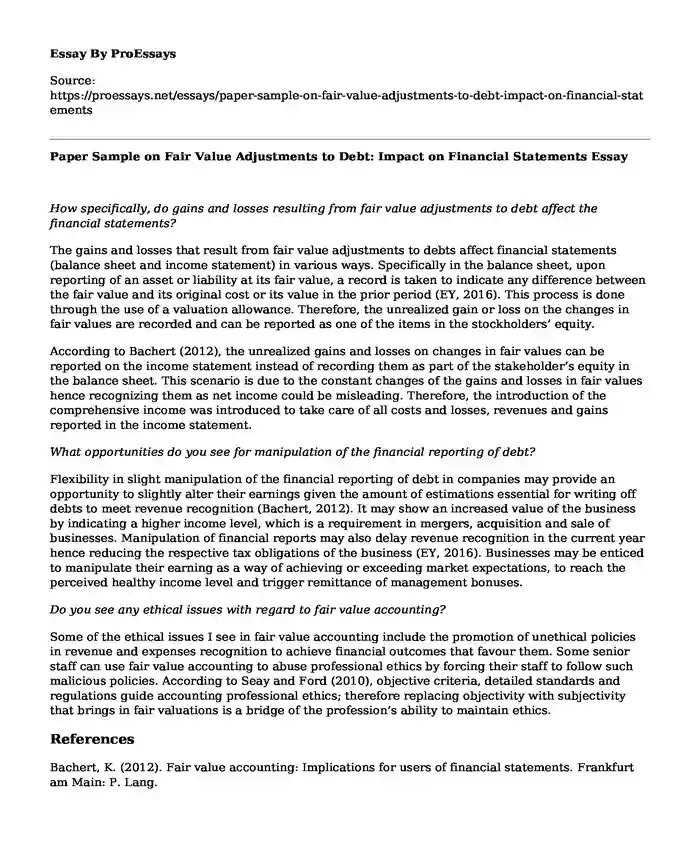How specifically, do gains and losses resulting from fair value adjustments to debt affect the financial statements?
The gains and losses that result from fair value adjustments to debts affect financial statements (balance sheet and income statement) in various ways. Specifically in the balance sheet, upon reporting of an asset or liability at its fair value, a record is taken to indicate any difference between the fair value and its original cost or its value in the prior period (EY, 2016). This process is done through the use of a valuation allowance. Therefore, the unrealized gain or loss on the changes in fair values are recorded and can be reported as one of the items in the stockholders’ equity.
According to Bachert (2012), the unrealized gains and losses on changes in fair values can be reported on the income statement instead of recording them as part of the stakeholder’s equity in the balance sheet. This scenario is due to the constant changes of the gains and losses in fair values hence recognizing them as net income could be misleading. Therefore, the introduction of the comprehensive income was introduced to take care of all costs and losses, revenues and gains reported in the income statement.
What opportunities do you see for manipulation of the financial reporting of debt?
Flexibility in slight manipulation of the financial reporting of debt in companies may provide an opportunity to slightly alter their earnings given the amount of estimations essential for writing off debts to meet revenue recognition (Bachert, 2012). It may show an increased value of the business by indicating a higher income level, which is a requirement in mergers, acquisition and sale of businesses. Manipulation of financial reports may also delay revenue recognition in the current year hence reducing the respective tax obligations of the business (EY, 2016). Businesses may be enticed to manipulate their earning as a way of achieving or exceeding market expectations, to reach the perceived healthy income level and trigger remittance of management bonuses.
Do you see any ethical issues with regard to fair value accounting?
Some of the ethical issues I see in fair value accounting include the promotion of unethical policies in revenue and expenses recognition to achieve financial outcomes that favour them. Some senior staff can use fair value accounting to abuse professional ethics by forcing their staff to follow such malicious policies. According to Seay and Ford (2010), objective criteria, detailed standards and regulations guide accounting professional ethics; therefore replacing objectivity with subjectivity that brings in fair valuations is a bridge of the profession’s ability to maintain ethics.
References
Bachert, K. (2012). Fair value accounting: Implications for users of financial statements. Frankfurt am Main: P. Lang.
EY. (2016 September). A comprehensive guide: Fair value measurement. Financial reportingdevelopments. https://www.eyjapan.jp/library/issue/us/gaap-weekly-update/pdf/GAAP-2016-09-15-02.pdf
Seay, S.S. & Ford, W.H. (2010). Fair presentation: An ethical perspective on fair value accounting pursuant to the SEC study on mark-to-market accounting. Journal of Legal, Ethical and Regulatory Issues. 13, pp. 53-66. https://www.researchgate.net/publication/288418174_Fair_presentation---An_ethical_perspective_on_fair_value_accounting_pursuant_to_the_SEC_study_on_mark-to-market_accounting/citation/download
Cite this page
Paper Sample on Fair Value Adjustments to Debt: Impact on Financial Statements. (2023, Oct 21). Retrieved from https://proessays.net/essays/paper-sample-on-fair-value-adjustments-to-debt-impact-on-financial-statements
If you are the original author of this essay and no longer wish to have it published on the ProEssays website, please click below to request its removal:
- Definition of Cryptocurrency and How It Works Essay
- Advantages and Disadvantages of Making Policies that Fund Scientific Research
- Business Groups Argumentative Essay
- Interpersonal Relationships and Business Negotiations Case Study
- NES China: An Ethical Dilemma and Its Consequences - Essay Sample
- Essay on My Reflection for Social & Cultural Entrepreneurship
- Raising Money from Friends and Family: Risks and Alternatives - Essay Sample







